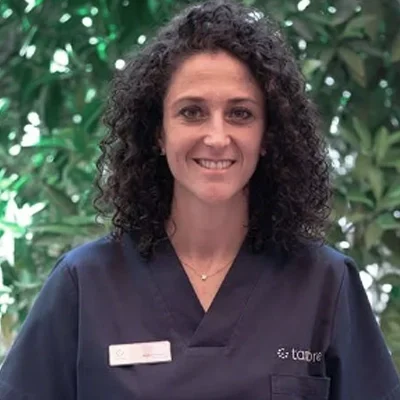Dra. Rachele Pandolfi
Biologist in the Andrology Laboratory
- Graduate in Biomolecular Sciences and Technologies from the University of Pisa (Italy) in 2010.
- Doctorate in Biomedical Research from the Complutense University of Madrid in 2015.
- Master’s Degree in Human Reproduction from the Complutense University of Madrid and the Spanish Fertility Society in 2017.
“A biologist has to be empathetic and convey clarity, security and confidence when we give information to patients.”
Learn more about me
My name is Rachele. I am Italian and have been in Spain for 12 years. I moved to Madrid after winning a 6-month research grant (Leonardo Da Vinci Project) organised by La Sapienza University of Rome. I developed the fellowship at the National Centre for Biotechnology (CNB). After the scholarship I completed a PhD in Biomedicine and a Post Doc at the Faculty of Medicine of the Complutense University of Madrid.
During my Post Doc, being surrounded by friends and acquaintances with fertility issues, I became interested in human assisted reproduction. For this reason, after finishing, I decided to dedicate myself to the world of reproduction through the study of a specific master’s degree in human assisted reproduction.
Thanks to these studies I had the opportunity to do my internship at the Tambre Clinic where I am working today.
Since I was a little girl I have always had a great interest in scientific (clinical-biological) subjects. At first I was planning to study medicine, but after my first year studying biology, I became so passionate about biology that I decided to pursue it.
I believe that a biologist dedicated to reproduction must have a lot of “self-control”, that is to say, the ability to maintain control and nerves in situations of stress, whether that’s from a high workload or emotional stress. This attitude is very important because the embryologist’s work is a very manual job that requires a lot of agility and practice and any kind of sudden movement can negatively affect the viability of the gametes and embryos. In addition, when giving information to patients, for example, about the quality and evolution of gametes and embryos, the biologist must be empathetic and convey clarity, security and confidence.
One of the aspects I like most about working as an embryologist is that we actively participate in the realisation of a couple’s dream and desire to become parents. The end result of our work is the couple’s happiness and the birth of a new life, so I believe that no one can have a better work goal to be proud of.
To improve the chances of conceiving I recommend a healthy and balanced lifestyle, avoiding the consumption or abuse of alcohol, tobacco, coffee and sugar. Nutrition is important and should be rich in a variety of nutrients and vitamins. In addition, it is necessary to do exercise to help maintain the body’s overall health and reduce stress.
When I don’t work and have free time, I like to play sports, go for a walk in nature, listen to music, go to the theatre or cinema, meet friends or family and travel.

